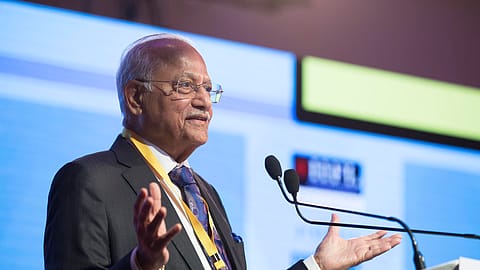Not just vaping, all kinds of smoking should be banned: Prathap Reddy
Apollo Hospitals founder Prathap Reddy says smoking should be banned as it is the biggest cause of lung and throat cancer.

All kinds of smoking should be banned and not just vaping, believes Apollo Hospitals chairman Prathap C. Reddy.
Giving his views on the ban on the sale of e-cigarettes, the 86-year-old said at his annual routine meeting with journalists in Mumbai on Wednesday that there are studies to show vaping alters the cells in the throat and lungs and can eventually lead to cancer.
“We should heed the studies on vaping. It’s not just vaping but I would say smoking should be banned as it is the biggest cause of lung and throat cancer.”
Apollo Hospitals, India’s leading hospital chain, has been a lot in the news lately. The group sold its stake in its insurance venture Apollo Munich as it did in Apollo Pharmacy. It is said more divestments could happen. The manoeuvres were ostensibly made to reduce the company’s debt which had spiralled to over ₹3,045 crore as of March 31, 2019.
In the last 30 months, Apollo has been moving at a breakneck pace. It set up 13 new hospitals, made three acquisitions, and spend ₹3,000 crore in the process. Dr Reddy and his daughter Suneeta Reddy, managing director, reiterated that the focus currently is to reap the benefit of these investments by increasing asset utilisation, earnings, and profitability. The company will also move towards an asset-light model and will start managing hospitals instead of owning hospitals, taking a leaf out of the hotel industry.
Over half of Apollo’s revenue comes from its hospitals and the rest from standalone pharmacies. Further breakup shows that 80% of the hospital revenue comes from mature hospitals that have been around for 10 years or more, while 20% is from new hospitals. Apollo’s EBIDTA from the mature hospital’s is 22.1%, while that from new hospital is 8%. The aim is to increase the contribution from the new hospitals. For example, in Navi Mumbai, where Apollo opened one of its biggest hospitals in recent times, the company is increasing beds in a phased manner as occupancy picks up. This is expected to shore up the profitability of the hospital, which is expected to take anywhere between seven-nine years to break even.
Even as the group sold its stake in the front-end of the pharmacy business to a clutch of investors, Apollo Hospitals will continue to hold a 25% stake in the entity. Further, 80% of the pharmacy business revenue will still accrue to Apollo as it still controls and owns the supply and several other parts of the business. As the new owners expand the retail presence of the pharmacy business quickly, Suneeta Reddy expects contribution from the business to grow rapidly in the coming years. The business also expects to see increased traction in private label products that are available through the stores.
Recommended Stories
Apollo’s management says its revenue from medical tourism will increase by 50% in the next two years and is expected to contribute 15% to the hospital revenues. It is further expected to become 20% by 2022. Says Dr Reddy, “Apart from costs of treatment, India also has a unique demographic profile whereas western countries like the U.K. and America are short of doctors and nurses. It is an opportunity which I have been talking about for a decade now.”
Reddy also feels that Prime Minister Narendra Modi’s Ayushman Bharat scheme is a very positive development and if the plan for 130,000 wellness centres is executed properly, the country’s healthcare system will have a bright future. Especially, he feels that India will be ahead of the curve in combating non-communicable diseases like cardiovascular issues, cancer, and diabetes. Reddy says that global reports put the global cost of treating non-communicable diseases at $30 trillion and there are estimates that in India 80% of the deaths will be on account of these diseases. Says Suneeta Reddy, “Going forward, Apollo won’t just focus on hospital care but put a lot of emphasis on preventive measures like tests and diagnosis.”